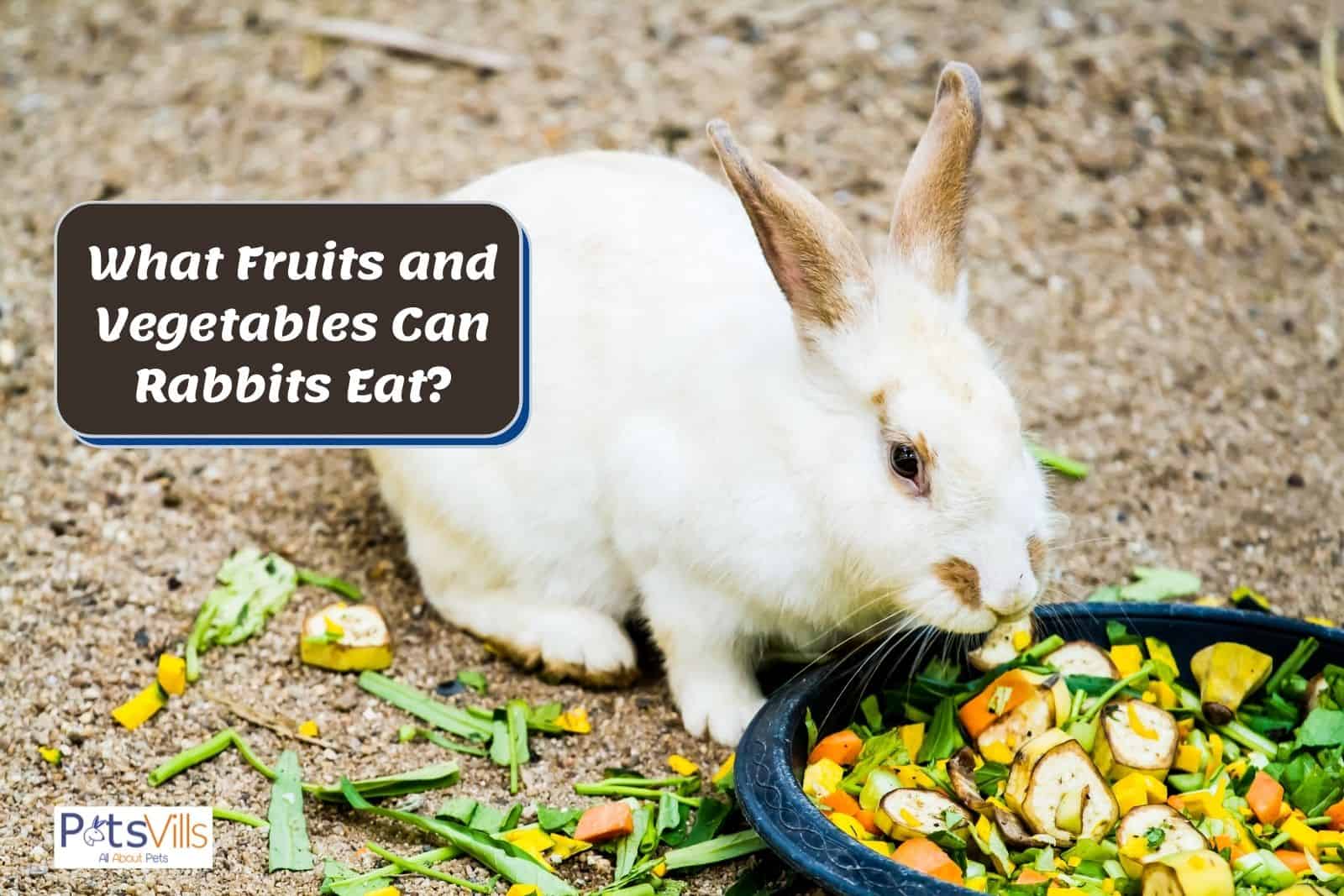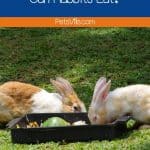It can be hard to know what foods you can and cannot feed your rabbit. That’s why we have put together this list of popular fruits and vegetables that your rabbit can and cannot eat!
Table of Contents
What Fruits Can Rabbits Eat?
Fruits are a healthy and delicious snack for your rabbit to enjoy. However, as fruits contain a lot of sugar [1], You should feed them to your pet in moderation
You should avoid feeding fruits to overweight rabbits for this reason too.
Before feeding your rabbit, fruits should be washed thoroughly (without soap!). You should also remove the pits or seeds from fruits as these are toxic [2].
Ensure you feed fruits and veggies raw to ensure your rabbit gets all their nutrients.
Around two tablespoons of fruit per 6 pounds of body weight is a good portion size for your rabbit. You shouldn’t feed your rabbit fruits more than twice a week.
Here’s a great video of safe fruits for bunnies:
Here is a list of fruits rabbits can eat.
- Blueberries
- Raspberries
- Pears (remove seeds)
- Banana
- Apricot (Can rabbits eat apricots?)
- Strawberries
- Apple (remove seeds)
- Cherries (remove pits)
- Blackberries
- Peach (remove pit)
- Plum (remove pit)
- Orange
- Tangerines
- Satsumas
- Tomatoes (not green sections)
- Watermelon
- Cranberries
- Grapes
- Kiwi fruit
- Mango
- Pineapple (Can rabbits eat pineapple?)
Cuteness.com has a great article to help you design your rabbit’s diet. [3] It’s beneficial and worth a read for all pet rabbit owners.
READ MORE: A Detailed Guide on What Can Bunnies Eat
Can Rabbits Eat Apples?
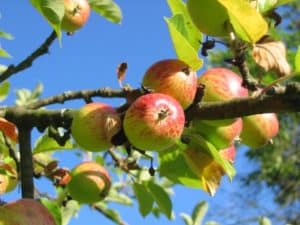
Yes, rabbits can eat apples.
However, apples contain a lot more sugar than other types of fruit, so you should not feed them too often.
You should make sure you remove the seeds and stems from apples before giving them to your rabbit.
Apple seeds and the stems contain small traces of cyanide, which can be harmful to your pet if they are ingested.
Chop the apple into small pieces before feeding it to your rabbit. Like with all fruits and veggies, wash apples thoroughly (without soap!) before feeding them to your rabbit.
Can Rabbits Eat Grapes?
Grapes are safe to feed your rabbit. It would be best if you also opted for seedless grapes.
Don’t feed grapes too often as they contain a lot of sugar.
Around four grapes each week should be more than enough for your rabbit!
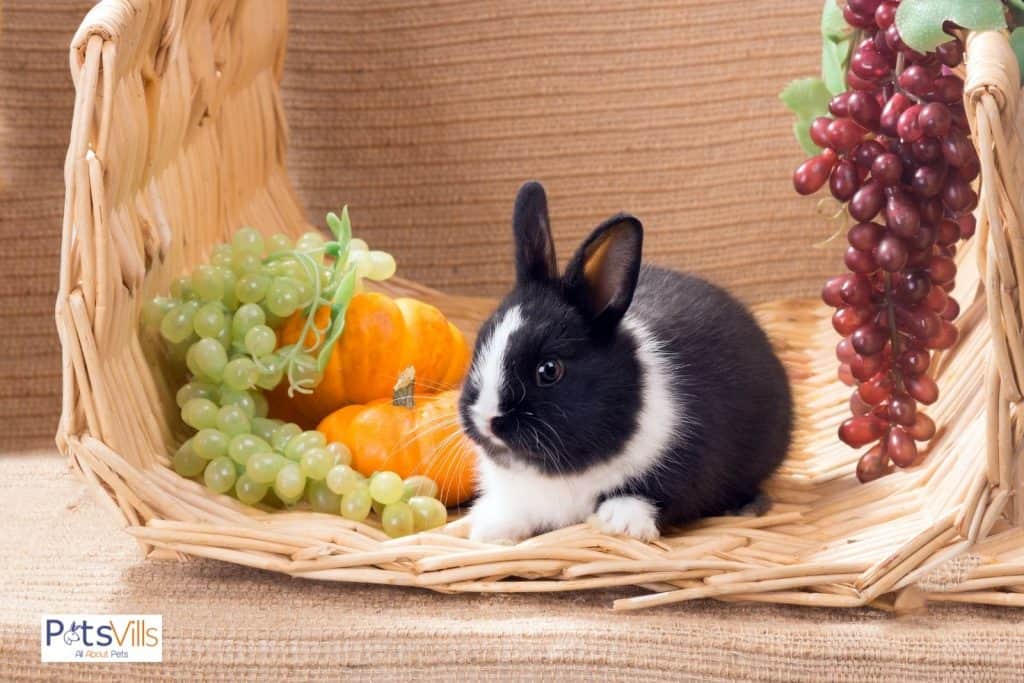
Chop the grapes into small pieces before feeding them. Make sure you wash them thoroughly too!
Can Rabbits Eat Bananas?
Rabbits can eat bananas. However, bananas are very high in sugar and contain a lot of starch [4].
Starchy foods can cause digestive problems in rabbits, so you should feed them very sparingly.
A small slice of banana is an adequate portion size for your rabbit.
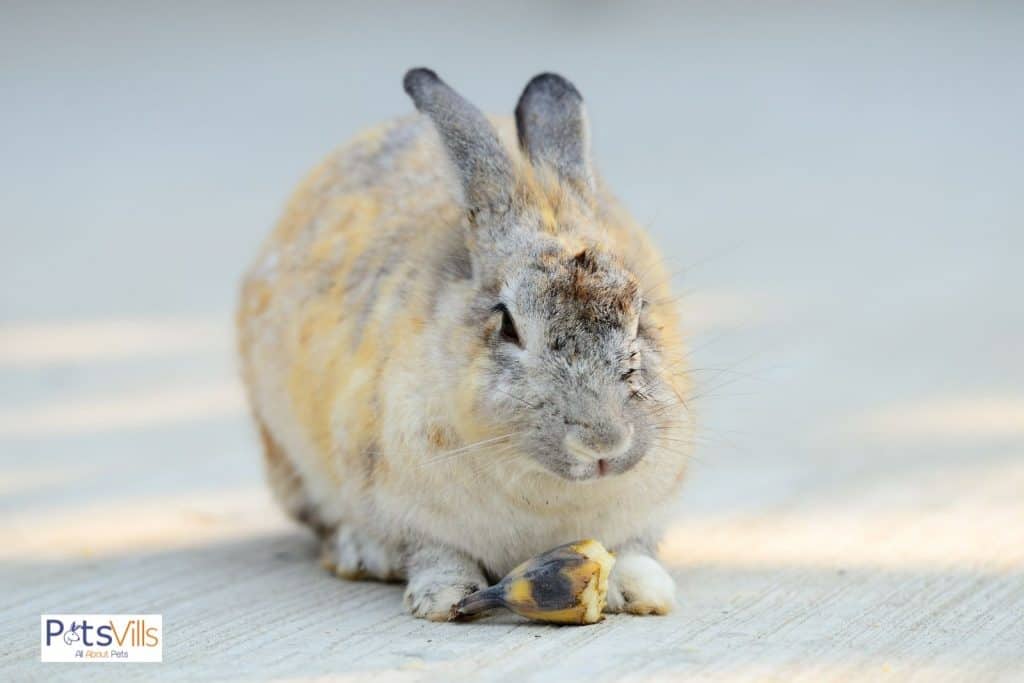
Rabbits can also eat banana peels/skin, but these should be fed even less than bananas!
The skin of a banana contains a lot of starch (even more than the banana itself), which could give your pet gastrointestinal issues.
RELATED: Can Rabbits Eat Ripe Bananas?
Can Rabbits Eat Strawberries?
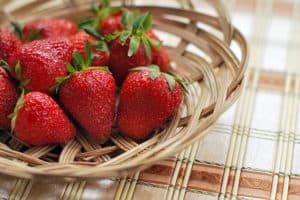
Strawberries are perfectly safe to feed your rabbit, but you should not provide them too often.
Strawberries are high in sugar, so a couple of slices now and again is more than enough for your rabbit.
Wash strawberries thoroughly before feeding them to your pet.
The tops of strawberries and the seeds are also acceptable to feed your rabbit, so you don’t need to remove them.
Can Rabbits Eat Blackberries?
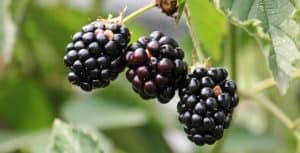
Yes, rabbits can eat blackberries. It would be best to make blackberries ripe before feeding them to your rabbit.
If blackberry is reddish, then they are not ripe! Feed blackberries in moderation due to their high sugar content.
If you are harvesting wild blackberries, make sure they are not sprayed with chemicals!
You should also wash blackberries thoroughly before feeding them to your pet.
Can Rabbits Eat Pears?
Pears are OK to feed your rabbit in moderation. Pears contain a lot of sugar, so you should not provide them too often.
Before feeding your rabbit a pear, make sure you remove the stem and seeds. These contain traces of cyanide, which can be harmful to your pet if ingested.
Cut the pear into small pieces before feeding it to your rabbit. Like all fruits and veggies, wash pears thoroughly before offering them to your pet.
Can Rabbits Eat Watermelons?
Watermelons are safe to feed your rabbit.
This fruit can be a great refreshing snack to feed your pet on a hot day!
However, watermelon is high in sugar, so you should not feed it regularly to your rabbit.
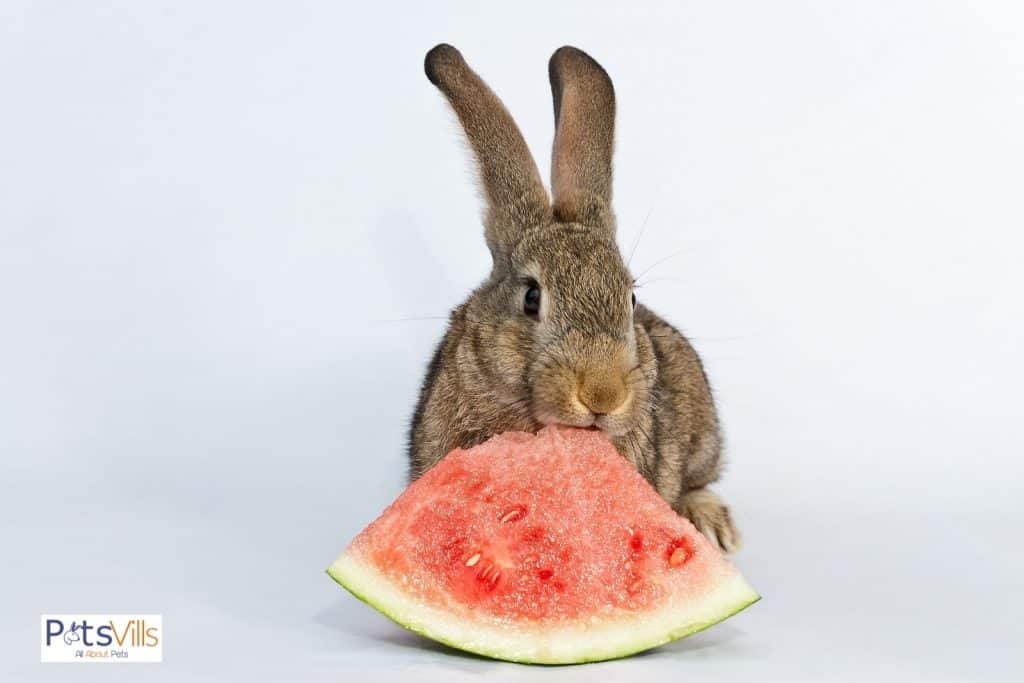
You should remove the seeds from the watermelon, but you can leave the rind on.
The rind on a watermelon contains less sugar than the flesh and is safe for your rabbit to consume (again, in moderation!).
Can Rabbits Eat Tomatoes?
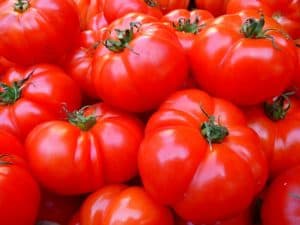
Tomatoes are safe for your rabbit to eat.
However, you should never feed your rabbit tomato tops or tomato leaves (or any green parts!) as they are very toxic for your pet!
Tomatoes contain a lot of sugar, so you should not feed them regularly.
All tomatoes are fine for your rabbit, including cherry tomatoes and beef tomatoes.
Please do not feed your rabbit green (unripe) tomatoes as they are toxic!
You should remove the seeds from tomatoes before feeding them to your rabbit.
What Vegetables Can Rabbits Eat?
Vegetables should make up 20% of your rabbit’s diet. Around a handful (adult-sized) of fresh leafy green veggies is what you should aim to feed your rabbit each day.
Ensure you feed your rabbit a variety of vegetables to ensure they get as many nutrients as possible.
Don’t just feed the same vegetable. Instead, offer your rabbit a few different veggies each day (around 3 to 6 is usually ideal) and change them around regularly.
Here is a list of vegetables that are safe to feed your rabbit. Some veggies can be provided often (like zucchini), while you should feed others in moderation (like carrots and turnips).
- Parsley
- Bok Choy
- Carrots (occasional)
- Broccoli (occasional)
- Celery
- Kale
- Cucumber
- Collard Greens
- Lettuce (dark colored varieties – Iceberg should be avoided!)
- Turnips (occasional)
- Watercress
- Zucchini
- Mint
- Mustard greens
- Cauliflower
- Rocket/arugula
- Pumpkin
- Squash
- Radish tops
- Green beans
- Peas
- Chicory
- Cabbage (can cause digestive upsets and gas, so very occasionally!)
- Asparagus (Can bunnies eat asparagus?)
- Brussel sprouts (occasional)
- Fennel
- Beetroot (occasional – use caution with the tops)
- Baby sweetcorn (not full-size ones!)
- Fennel
- Dill
- Celeriac
- Artichoke leaves
- Eggplant
Can Rabbits Eat Carrots?
Yes, rabbits can eat carrots. It would be difficult to find a rabbit who doesn’t love carrots!
However, it would help if you did not feed carrots should too often.
Although carrots are a good source of vitamin A, they are also high in sugar and calcium!
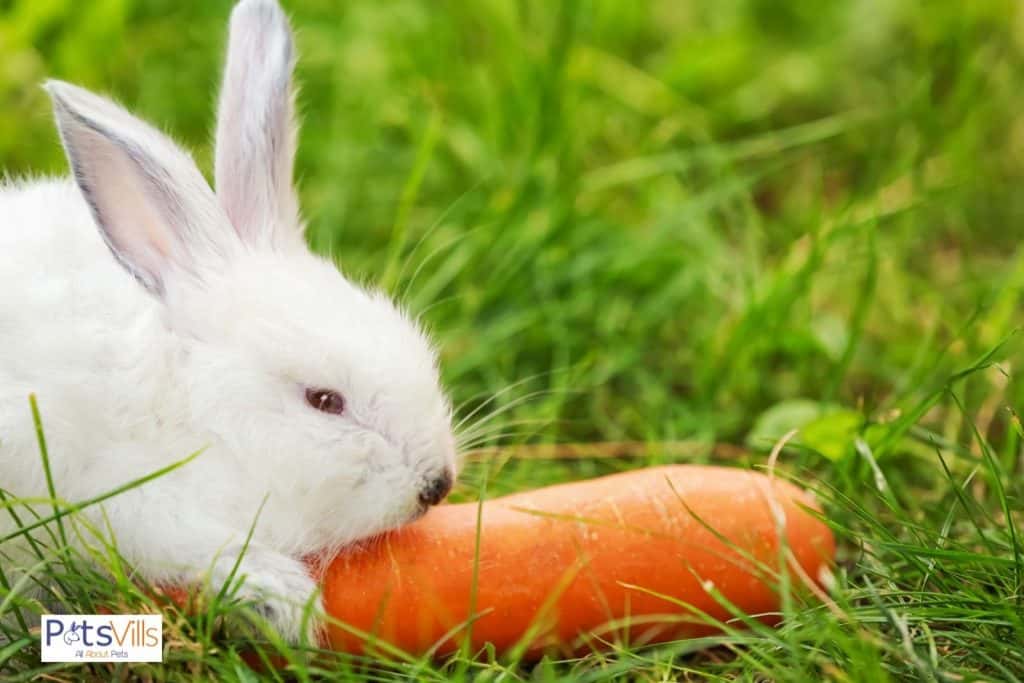
On the other hand, you can regularly give carrot tops to rabbits.
Can Rabbits Eat Lettuce?
You can feed Lettuce to rabbits, but it is best avoided.
Light-colored lettuces are very watery and contain little national value, so they are not very beneficial for rabbits and should be avoided.
Iceberg lettuce should never be fed to rabbits as it contains lactucarium.
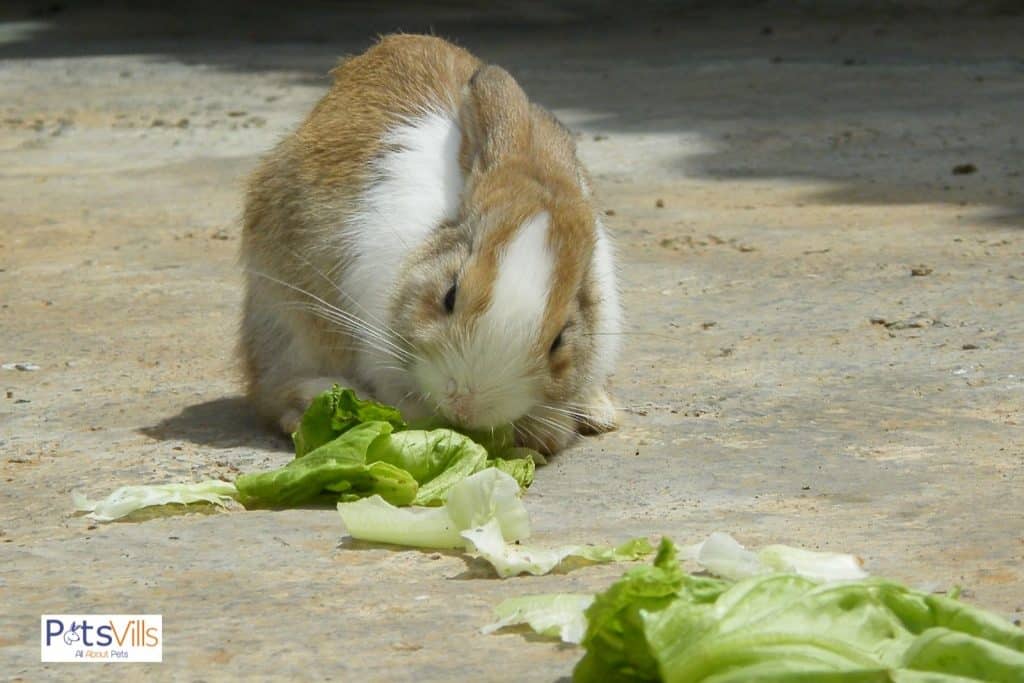
Romaine lettuce is leafier and more fibrous to be fed to rabbits. However, even romaine lettuce can cause digestive issues, so it should not be provided in considerable amounts.
Dark-colored lettuces can be fed to your rabbit (but again, in moderation!)
When feeding your safe rabbit types of lettuce for the first time, only offer them a very tiny piece. You should monitor your pet for 24 hours to ensure they do not get a bad reaction from it.
Can Rabbits Eat Cucumber?
Cucumber can be fed to rabbits, but it is very watery and has little nutritional value.
If fed in large quantities or regularly, cucumber can cause diarrhea and digestive issues in rabbits.
It is best to feed cucumbers in small amounts every once in a while
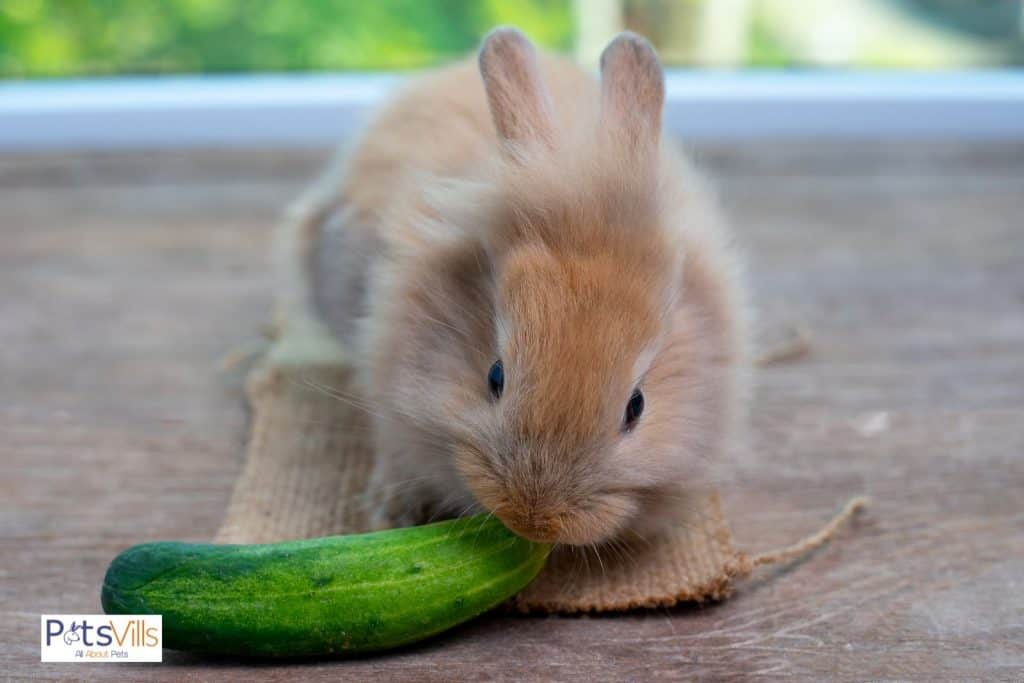
Cucumber skin is fine for your rabbit to consume, so you don’t need to remove it.
Cucumber seeds are also safe for rabbits, but you should make sure you remove seeds/pits from most fruits and veggies.
Cucumber would be a great treat to feed your rabbit now and again on a hot day. The high amount of water in cucumber is excellent for keeping your pet hydrated and refreshed in warm weather!
Can Rabbits Eat Celery?
Celery is a great vegetable to feed your rabbit. Celery contains potassium, vitamin B1, vitamin B2, vitamin B6, folic acid, and other nutrients!
Celery is an ideal vegetable to feed your rabbit regularly as it is very beneficial for them!
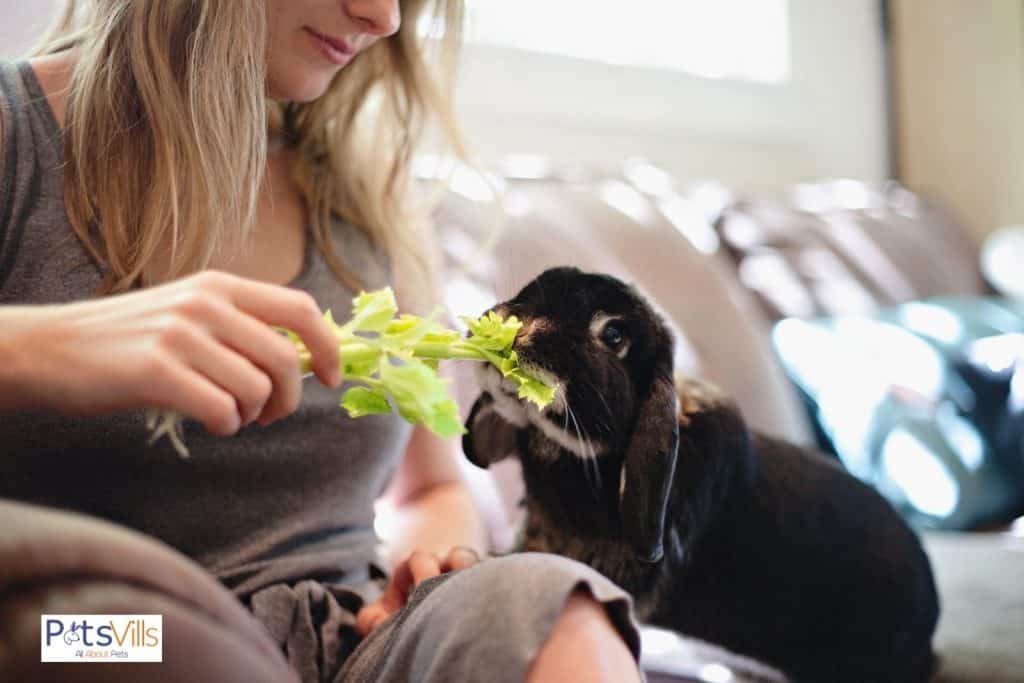
You can even feed celery leaves and the tops of celery to your rabbit! However, make sure you wash these thoroughly before feeding them to your pet.
Make sure you offer a variety of vegetables to your rabbit and switch them up regularly!
Don’t forget to also read, “Can Rabbits Eat Celery Root?”
Can Rabbits Eat Spinach?
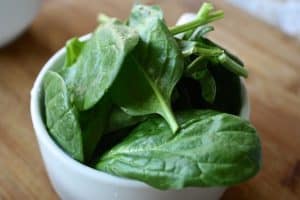
Spinach is safe for rabbits but you feed them too often.
Spinach contains a lot of oxalates and iron [5], so you shouldn’t feed it daily.
Spinach has a high vitamin C, vitamin E, and vitamin K and contains many other nutrients your rabbit will benefit from.
However, spinach is also high in oxalic acid.
Oxalates are harmful to your rabbit if they consume them too often. They can cause urinary tract issues and skin/mouth itchiness when fed in large quantities.
That’s why it’s important not to feed vegetables containing many oxalates frequently.
Here is a list of other leafy green vegetables high in oxalic acid:
- Mustard greens
- Beet greens
- Parsley
- Sprouts
- Swiss Chard
- Radish tops
Although rabbits require around 3 to 5 leafy greens vegetables daily, spinach is a leafy green that shouldn’t be fed each day.
Instead, spinach should be fed a few times a week, alongside other types of leafy green vegetables.
Can Rabbits Eat Cabbage?
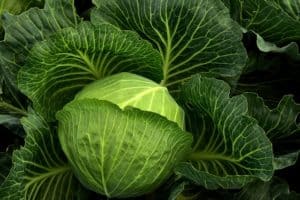
So, can rabbits eat cabbage? You should avoid feeding your rabbit cabbage. Cabbage can cause your rabbit’s thyroid gland to expand in large quantities.
It can also cause digestive issues, such as flatulence and diarrhea.
With this in mind, it is best to avoid feeding cabbage to your rabbit altogether.
Can Rabbits Eat Peppers?
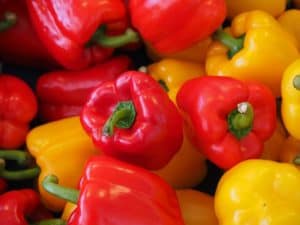
Peppers (non-spicy types!) are a great food to feed your rabbit regularly.
They are packed full of vitamin C which is very beneficial for your rabbit.
Before feeding your rabbit peppers, make sure you remove the seeds as they are a choking hazard!
Bell peppers are suitable for your rabbit. They come in many colors: green, yellow, red, purple, and black.
All these colors except the black variety can be fed to your rabbit. However, green bell peppers should be provided in moderation due to their high acidity levels.
Can Rabbits Eat Sunflower Seeds?
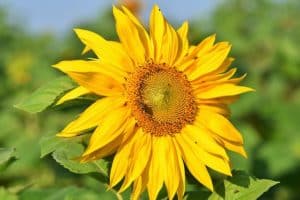
Rabbits should not eat striped sunflower seeds at their shells are tough.
Striped sunflower seeds are a choking hazard and can become lodged in your rabbit’s teeth and digestive system!
However, black oil sunflower seeds have softer shells and can occasionally feed your pet.
Black oil sunflower seeds are still sunflowers seeds, so they are very high in fat.
They should not be given to rabbits often and only as an occasional treat.
What Fruits Can Rabbits Not Eat?
Most fruits are fine for your rabbit to eat in moderation, but there are a couple that your pet should avoid.
Here is a list of fruits that are unsafe for rabbits.
- Tomato leaves/stalks (the fruit is fine, but the green parts are toxic)
- Most citrus fruits (oranges, satsumas, etc. are fine, but other citrus fruits like lemons are too sour and acidic)
What Vegetables Can Rabbits Not Eat?
Although rabbits are herbivores, there are certain vegetables that rabbits should not consume.
Here is a list of vegetables that are unsafe for rabbits.
- Potatoes (including sweet potatoes)
- Avocado
- Rhubarb
- Onion (all varieties)
- Leeks
- Chives
- Iceberg lettuce/light-colored lettuce
- Cabbage (can cause gas and stomach upsets in big quantities, so best to avoid it!)
READ MORE: Do Rabbits Eat Daisies?
FAQs
Can rabbits eat garlic?
No! Garlic should never be fed to rabbits as it can cause anaphylactic shock and immunosuppressive effects.
Can rabbits eat dandelions?

Dandelions are a delicious and nutritious snack for your rabbit. They contain a lot of nutrients that are great for your pet. Ensure the dandelions you harvest for your rabbit have not been treated with pesticides or chemicals.
Can rabbits eat peanuts?
It is not recommended for rabbits to consume peanuts. Peanuts and other nuts are high in fat and are not very beneficial to your rabbit’s health.
Resources
- 1. Slideshow: Which Fruits Have the Most Sugar? [Internet]. WebMD. Available from: https://www.webmd.com/diet/ss/slideshow-fruit-sugar
- 2. Are Cherry Pits Safe to Eat? Cyanide Content and More [Internet]. Healthline. 2021 [cited 2022 Jan 20]. Available from: https://www.healthline.com/nutrition/cherry-pits
- 3. Cerulli P. What Fruits & Vegetables Can Rabbits Eat? [Internet]. Cuteness.com. Cuteness; 2010. Available from: https://www.cuteness.com/article/fruits-vegetables-can-rabbits-eat
- 4. Arnarson A. Bananas 101: Nutrition Facts and Health Benefits [Internet]. Healthline. Healthline Media; 2019. Available from: https://www.healthline.com/nutrition/foods/bananas
- 5. Why Most Iron In Spinach Is Useless [Internet]. www.nutritics.com. [cited 2022 Jan 20]. Available from: https://www.nutritics.com/p/news_Why-Most-Iron-In-Spinach-Is-Useless#:~:text=Secondly%2C%20spinach%20has%20such%20high
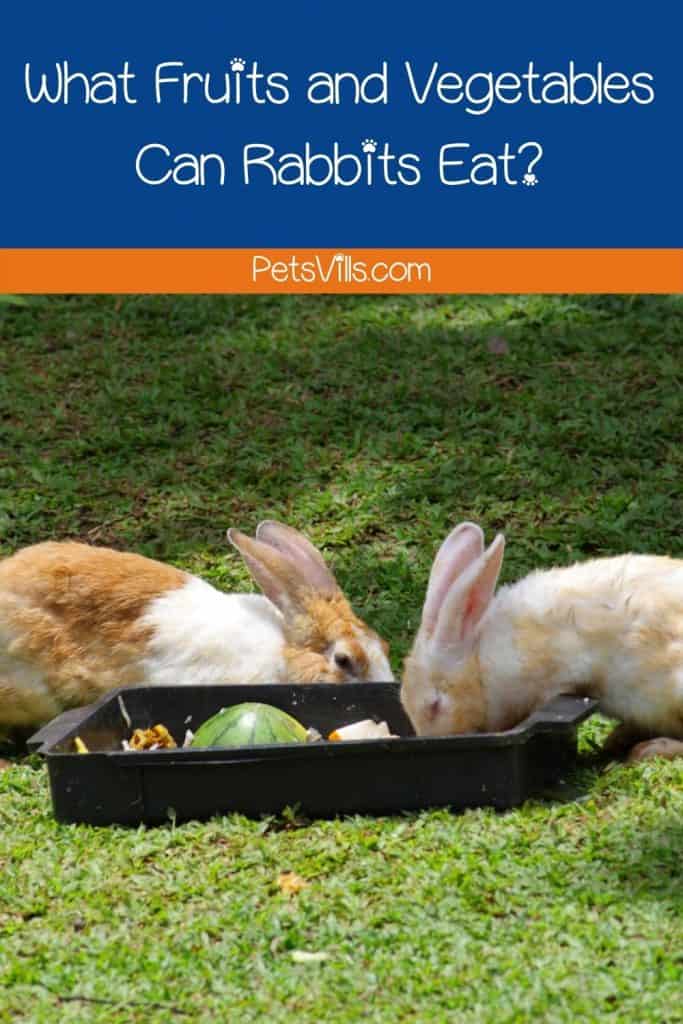
What foods do your rabbits love? Let us know below!
Alina Hartley is a small-town girl with a ginormous love of bearded dragons. It all started with Winchester, a baby bearded who was abandoned at the shelter by his former owners because of a birth defect that caused one front leg to be shorter than the other. Alina originally went to the shelter looking for a guinea pig, but one look at Winchester and it was love at first sight. From that day on, Alina has dedicated her life to learning everything she can about bearded dragons. She loves helping new beardie parents start their incredible journey with these magnificent reptiles.
Follow her on:
LINKEDIN
TWITTER.
Read her latest articles HERE
Learn more about her HERE.

